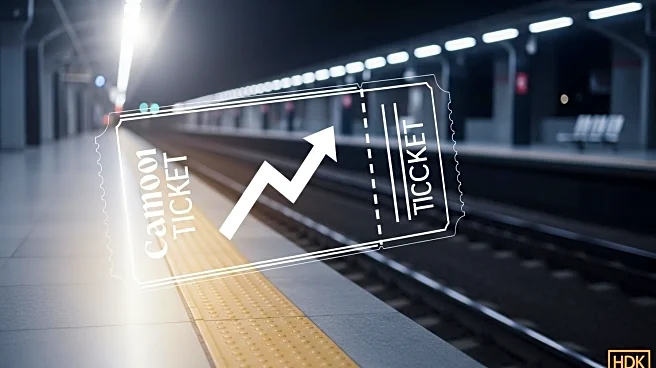What's Happening?
Metra, the commuter rail service in Chicago, has proposed a 13% fare increase for 2026 as part of its budget plan to address a looming fiscal crisis. The proposed budget, which totals $1.1 billion, includes $55 million for improvements on the Metra Electric Line and a $575.3 million capital budget for new railcars and infrastructure upgrades. The fare increase is set to affect riders starting February 1, with one-way rides between Zone 1 and Zone 2 increasing from $3.75 to $4.25. Monthly passes will also see significant price hikes. Metra's budget proposal comes as state lawmakers prepare for a legislative veto session, where additional transit funding may be discussed. Despite the fiscal challenges, Metra CEO Jim Derwinski stated that train service cuts are not expected next year, although significant reductions could occur in 2027 without legislative action.
Why It's Important?
The proposed fare increase by Metra highlights the financial strain faced by public transit systems as they deplete federal pandemic relief funds. This development is crucial for commuters who rely on affordable transportation options, as increased fares may lead to reduced ridership. The fiscal challenges faced by Metra, CTA, and Pace underscore the need for sustainable funding solutions to maintain and improve transit services. The fare hikes could disproportionately affect lower-income riders who depend on public transportation for daily commutes. Additionally, the budget proposal reflects broader economic pressures on public infrastructure, necessitating legislative intervention to prevent service cuts and ensure continued investment in transit improvements.
What's Next?
State lawmakers are expected to address transit funding during the upcoming legislative veto session. If additional funding is approved, Metra has prepared an alternate budget that would allow for modest service expansions. However, if lawmakers fail to act, Metra may face significant service cuts in 2027. The Regional Transportation Authority (RTA) has revised its deficit estimates, reducing the projected shortfall for next year, but warns of a larger gap in 2027. The outcome of the legislative session will be pivotal in determining the future of public transit services in the region, impacting commuters and the overall transportation infrastructure.
Beyond the Headlines
The fare increase proposal by Metra raises ethical considerations regarding equitable access to public transportation. As fares rise, the burden on low-income communities may increase, potentially exacerbating social inequalities. The fiscal challenges faced by transit agencies also highlight the need for innovative funding mechanisms and policy reforms to ensure long-term sustainability. The situation underscores the importance of public transit as a critical component of urban infrastructure, influencing economic mobility and environmental sustainability.









